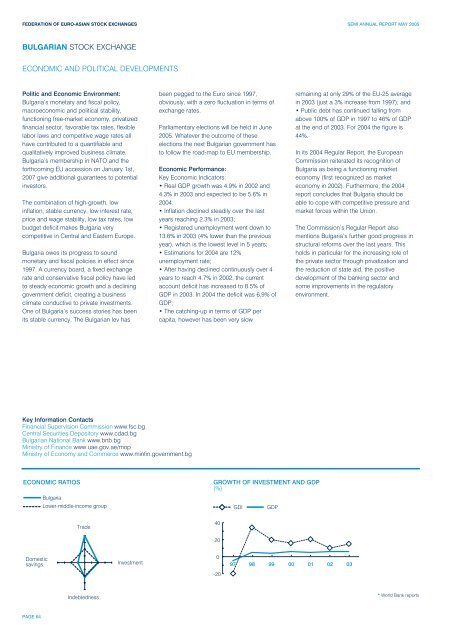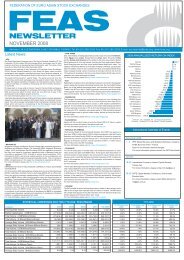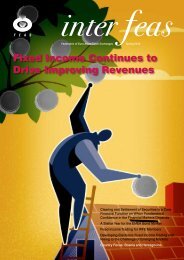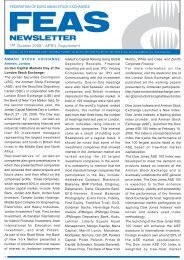Download - FEAS xxx.fh9
Download - FEAS xxx.fh9
Download - FEAS xxx.fh9
You also want an ePaper? Increase the reach of your titles
YUMPU automatically turns print PDFs into web optimized ePapers that Google loves.
FEDERATION OF EURO-ASIAN STOCK EXCHANGES SEMI ANNUAL REPORT MAY 2005<br />
BULGARIAN STOCK EXCHANGE<br />
ECONOMIC AND POLITICAL DEVELOPMENTS<br />
Politic and Economic Environment:<br />
Bulgaria’s monetary and fiscal policy,<br />
macroeconomic and political stability,<br />
functioning free-market economy, privatized<br />
financial sector, favorable tax rates, flexible<br />
labor laws and competitive wage rates all<br />
have contributed to a quantifiable and<br />
qualitatively improved business climate.<br />
Bulgaria’s membership in NATO and the<br />
forthcoming EU accession on January 1st,<br />
2007 give additional guarantees to potential<br />
investors.<br />
The combination of high-growth, low<br />
inflation, stable currency, low interest rate,<br />
price and wage stability, low tax rates, low<br />
budget deficit makes Bulgaria very<br />
competitive in Central and Eastern Europe.<br />
Bulgaria owes its progress to sound<br />
monetary and fiscal policies in effect since<br />
1997. A currency board, a fixed exchange<br />
rate and conservative fiscal policy have led<br />
to steady economic growth and a declining<br />
government deficit, creating a business<br />
climate conductive to private investments.<br />
One of Bulgaria’s success stories has been<br />
its stable currency. The Bulgarian lev has<br />
Key Information Contacts<br />
Financial Supervision Commission www.fsc.bg<br />
Central Securities Depository www.cdad.bg<br />
Bulgarian National Bank www.bnb.bg<br />
Ministry of Finance www.uae.gov.ae/mop<br />
Ministry of Economy and Commerce www.minfin.government.bg<br />
ECONOMIC RATIOS<br />
Domestic<br />
savings<br />
PAGE 64<br />
Bulgaria<br />
Lower-middle-income group<br />
Trade<br />
Indebtedness<br />
Investment<br />
been pegged to the Euro since 1997,<br />
obviously, with a zero fluctuation in terms of<br />
exchange rates.<br />
Parliamentary elections will be held in June<br />
2005. Whatever the outcome of these<br />
elections the next Bulgarian government has<br />
to follow the road-map to EU membership.<br />
Economic Performance:<br />
Key Economic Indicators:<br />
• Real GDP growth was 4.9% in 2002 and<br />
4.3% in 2003 and expected to be 5.6% in<br />
2004.<br />
• Inflation declined steadily over the last<br />
years reaching 2.3% in 2003;<br />
• Registered unemployment went down to<br />
13.6% in 2003 (4% lower than the previous<br />
year), which is the lowest level in 5 years;<br />
• Estimations for 2004 are 12%<br />
unemployment rate;<br />
• After having declined continuously over 4<br />
years to reach 4.7% in 2002, the current<br />
account deficit has increased to 8.5% of<br />
GDP in 2003. In 2004 the deficit was 6,9% of<br />
GDP;<br />
• The catching-up in terms of GDP per<br />
capita, however has been very slow<br />
GROWTH OF INVESTMENT AND GDP<br />
(%)<br />
40<br />
20<br />
0<br />
-20<br />
97<br />
GDI GDP<br />
remaining at only 29% of the EU-25 average<br />
in 2003 (just a 3% increase from 1997); and<br />
• Public debt has continued falling from<br />
above 100% of GDP in 1997 to 46% of GDP<br />
at the end of 2003. For 2004 the figure is<br />
44%.<br />
In its 2004 Regular Report, the European<br />
Commission reiterated its recognition of<br />
Bulgaria as being a functioning market<br />
economy (first recognized as market<br />
economy in 2002). Furthermore, the 2004<br />
report concludes that Bulgaria should be<br />
able to cope with competitive pressure and<br />
market forces within the Union.<br />
The Commission’s Regular Report also<br />
mentions Bulgaria’s further good progress in<br />
structural reforms over the last years. This<br />
holds in particular for the increasing role of<br />
the private sector through privatization and<br />
the reduction of state aid, the positive<br />
development of the banking sector and<br />
some improvements in the regulatory<br />
environment.<br />
98 99 00 01 02 03<br />
* World Bank reports
















